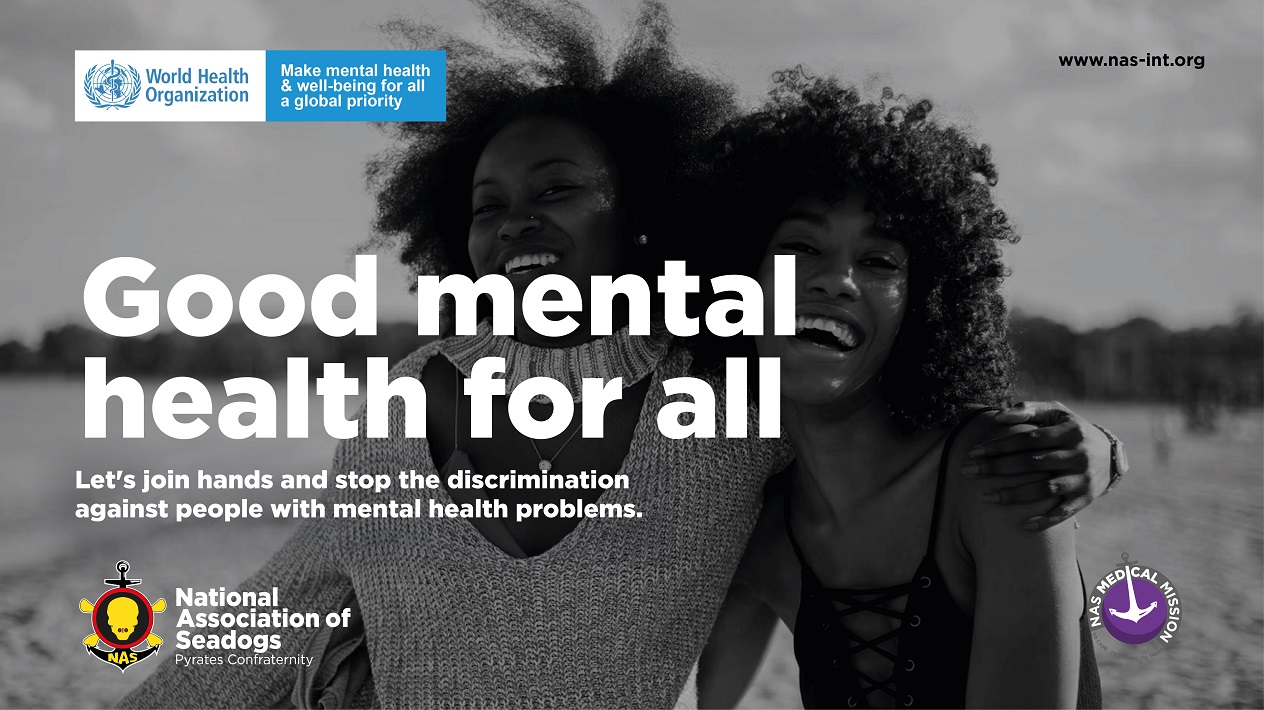Mental Health Deserves Urgent Attention in Nigeria
The theme for the 2022 World Mental Health Day – Make Mental Health and Well Being For All a Global Priority drives home the urgent need for countries around the world to pay more attention to the mental well being of their citizens.
Since the World Federation for Mental Health designated October 10 every year to mark the World Mental Health Day, efforts have been doubled-up to give considerable awareness to issues surrounding mental health and mobilise support in pushing it to the front burner of global discourse.
As the world marks this year’s event, the National Association of Seadogs, Pyrates Confraternity, also wishes to lend its voice to renewed calls for more concerted action to mental health issues.
This year’s theme highlights the importance of the recognition and promotion of mental health and well-being, and not merely the absence of illness and infirmity. It seeks to make mental health a focussed goal of governments, healthcare providers, social groups and individuals worldwide. It aims to enhance our collective capacity to identify, treat and prevent mental illness and infirmity, as well as adopt a proactive approach to the promotion of mental health and well-being, as a holistic health and social practice.
The National Association of Seadogs, Pyrates Confraternity has been active in the promotion of mental health and well-being through the deployment of in-house specialist knowledge and expertise in the areas of health education and service provision. We recognize that man is a social animal and healthy mental functioning is an aggregate of the effective deployment of all resources available to each individual. We view robust mental health as a composite of healthy lives across multiple social domains – relationships, financial, self-worth, self-esteem, job satisfaction, dignity and other intangible but important aspects of healthy human functioning. The importance of camaraderie and be-your-brother’s-keeper are important ingredients of mental health that we promote within our organisation and the social and family networks we are affiliated with and have influence on.
Quite disturbing however is the grim statistics of mental illness in Africa. According to the World Health Organisation (WHO), 11 people per 100,000 per year die by suicide in Africa. The global body stated that factors such as insufficient action to address and prevent risk factors have contributed significantly to this development.
Equally in Nigeria, the statistics are depressing. Presently, more than “60 million Nigerians are suffering from mental illnesses”, as disclosed by Dr Taiwo Obindo, President, Association of Psychiatrists in Nigeria (APN). Out of this number, Obindo said “only 10 percent can access appropriate care”. The implication is that 90 percent of Nigerians suffering from mental illnesses are without treatment leaving them vulnerable.
Recently the wife of the President, Mrs Aisha Buhari at the ground-breaking ceremony of the Armed Forces Post Traumatic Stress Disorder Centre (AFPTSDC) initiated by the Mrs Lucky Irabor-led Defence and Police Officers’ Wives Association (DEPOWA), disclosed her untold struggles and associated pains to cope with President Muhammadu Buhari over his post-traumatic stress disorder (PTSD) after leaving the Nigeria Army. Clearly, this one out of a million cases of mental illnesses among Nigerians induced by several factors further brings home the urgent need to pay close attention to mental healthcare in Nigeria.
On this occasion, we call governments and non-governmental organisations to redouble their efforts in promoting the mental health and well-being of all, especially the disadvantaged and vulnerable citizens of our communities, and ensure that adequate resources are provided for the interventions required to promote these ideals, provide treatment where necessary and strengthen those social safety nets that constitute the crucial links in the chain of our common humanity.
We urge the government to take sincere steps to address holistically the sorry state of mental healthcare in Nigeria. Government should halt the brain drain being experienced in Nigeria by upgrading mental healthcare facilities while provisions should be made to ensure Nigerians suffering mental illnesses in rural areas are not neglected. A situation whereby there are roughly 250 psychiatrists for over 200 million people is not acceptable. Adequate funding should be provided for remuneration and retraining of mental health practitioners to retain their services for Nigerians.
Mental health and well-being is an achievable goal if we all make it a global priority. We recommend this task to us all.
Abiola Owoaje
NAS Capoon
Abuja




